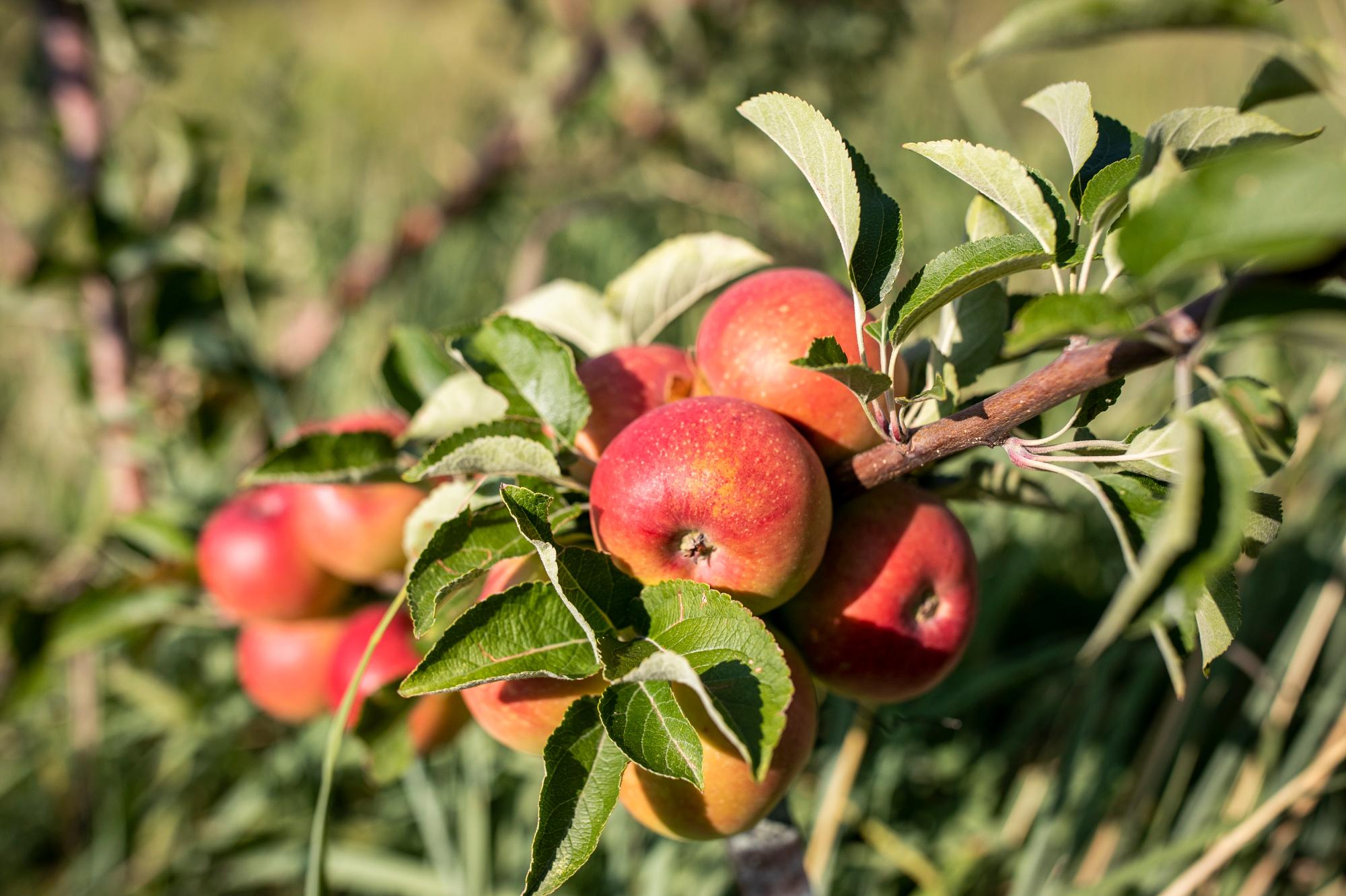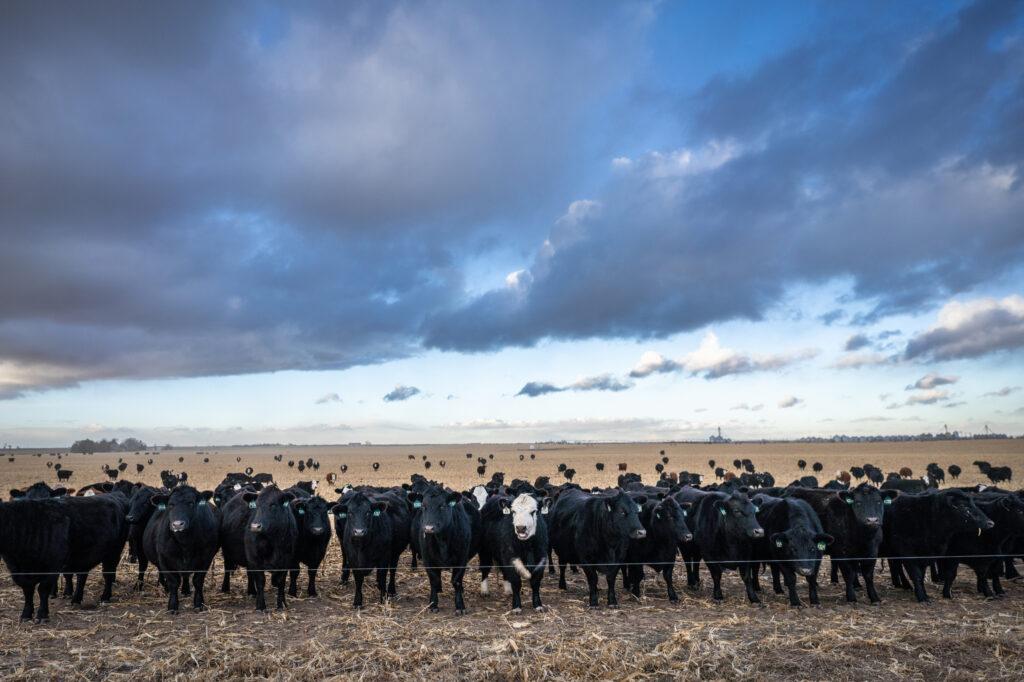
Updated at 7:37 p.m. on Wednesday, April 9, 2025.
Colorado farmers say they expect multiple tariff impacts on both their operations and consumers to take effect over the next year.
Steve Ela, who owns Ela Family Farms on the Western Slope, said Colorado growers would be immediately impacted by tariffs imposed by the Trump Administration on basic farm inputs.
“If tractor parts and fuel and various other crop inputs are affected, that raises our cost of production,” Ela said. Higher production costs usually result in higher prices for consumers.
Additionally, farmers who sell goods in foreign markets could see customers disappear as countries slap retaliatory tariffs on American products like crops and meat. On Friday, China hit all U.S. goods with a 34 percent tariff, which will make U.S. goods like soybeans, beef, and even apples more expensive there. Beijing’s announcement caused crop profit margins across the nation to drop almost overnight. Then, this week, China increased that tariff to 84 percent, and President Donald Trump responded with a 125 percent tariff on Chinese goods.
“Anytime you have massive market disruptions and you create unsettlement, that makes us all nervous," Ela said. "As farmers, we have enough problems with Mother Nature and labor and other costs all over the place. Having markets fluctuate wildly really makes it harder to plan ahead."
On Wednesday, after days of mounting concerns, Trump placed a 90-day delay on some reciprocal tariffs he announced last week but left a 10 percent universal tariff on almost all countries as well as the 125 percent tariff on China and 25 percent tariffs on Canada and Mexico. All the uncertainty has shocked businesses and investors, but this isn’t the first time local farmers have had to worry about global market shocks.
“The last big disruption of this magnitude that we had was definitely Covid,” Dawn Thilmany, a professor in the department of Agriculture and Resource Economics at Colorado State University, said.
“[During the pandemic], food products going through wholesale all of a sudden had to go through retail because people were making food at home instead of going to restaurants and eating at school and work,” she said. “This time, it's different.”

Thilmany says this disruption will likely be less about where to find groceries and more about what kinds of groceries are available — or affordable to the average customer.
“We love to have all of our produce year-round, but there's very few states in our country — and particularly Colorado — where we can’t grow year-round unless we're in greenhouses. We're definitely going to see prices go up on items,” Thilmany said. “The ones you hear about are coffee, chocolate, avocados, pineapples.”
Thilmany said because tariffs are moving so quickly, producers who haven’t started marketing domestically won’t have time to adjust. “Producers don’t have time to reconsider what markets they're going to sell to if (they can’t) export,” Thimany said. “You don't switch from being an apple producer to a peach producer in one year.”
Ela Family Farms assistant manager Reagan Choi said Western Slope apple farmers have felt the impacts of lost foreign markets in the past.
“In the early 2000s, there were some global market troubles that caused Japan and China and a lot of countries that import fruit to stop importing U.S. apples,” said Choi. “All of those apples ended up dumped back on the domestic market, which tanked the prices. It cost more to pick the apples than to let them just sit on the trees.”
What about groceries? Farmers markets could be the answer, again
The U.S. is headed into the growing season, where specialty crops like fruits and vegetables are harvested locally, which means customers won’t be as reliant on foreign imports for several months.
In 2020, the shift to farmers’ markets happened quickly, with stores running out of food due to supply chain issues. Local farmers’ markets saw a boost as people’s habits changed. “We saw a spike in our CSA membership, which is community-supported agriculture where people pay at the start of the year for a share of a farm's produce,” Choi said.
But exactly when the tariffs might push people into the arms of their local growers remains to be seen.
“The pandemic shutdowns and all the supply chain disruptions did get people thinking about the importance of the local food supply and how important it is to reinvest our dollars locally and to keep our local economies growing,” Choi said. “So from that perspective, maybe people will be pushed towards more local buying and more farmers' markets.”
“It might be next winter before [consumers] feel it fully,” Thilmany said. “There's just some products we will have a really hard time meeting the demand for, or we're going to have a shock to consumers because it's going to be at a price point they're not used to.”

“We've also seen in harder economic times people actually spend more at the farmers’ markets because the effect is they're going out to eat less and because they're going out to eat less. They're willing to spend a little bit more for what they're eating at home and getting higher quality food,” Ela said.
Meanwhile, Thilmany said tariffs could diversify domestic crops in the long run. “The silver lining people keep telling us to look for is that maybe it'll domesticate some of our food supply,” she said.
That’s something Ela and other farmers have long been advocating for. “So instead of importing more, we could have more organic growers on the ground in the United States and help solve some of those problems. In that case, the tariffs wouldn't matter too much,” Ela said.
But it’s likely going to get hard before it gets better.
“What I think about immediately is a whole swath of fruits and vegetables we've been telling people to eat more of in their diets,” Thilmany said. “A lot of the products you would want to store up on are not very storable now, but a good run to the liquor store to get some French champagne or some international beers — if that's what you prefer — might not be a bad idea.”
Editor's Note: This story was updated to reflect the latest tariff rates as of Wednesday night.









